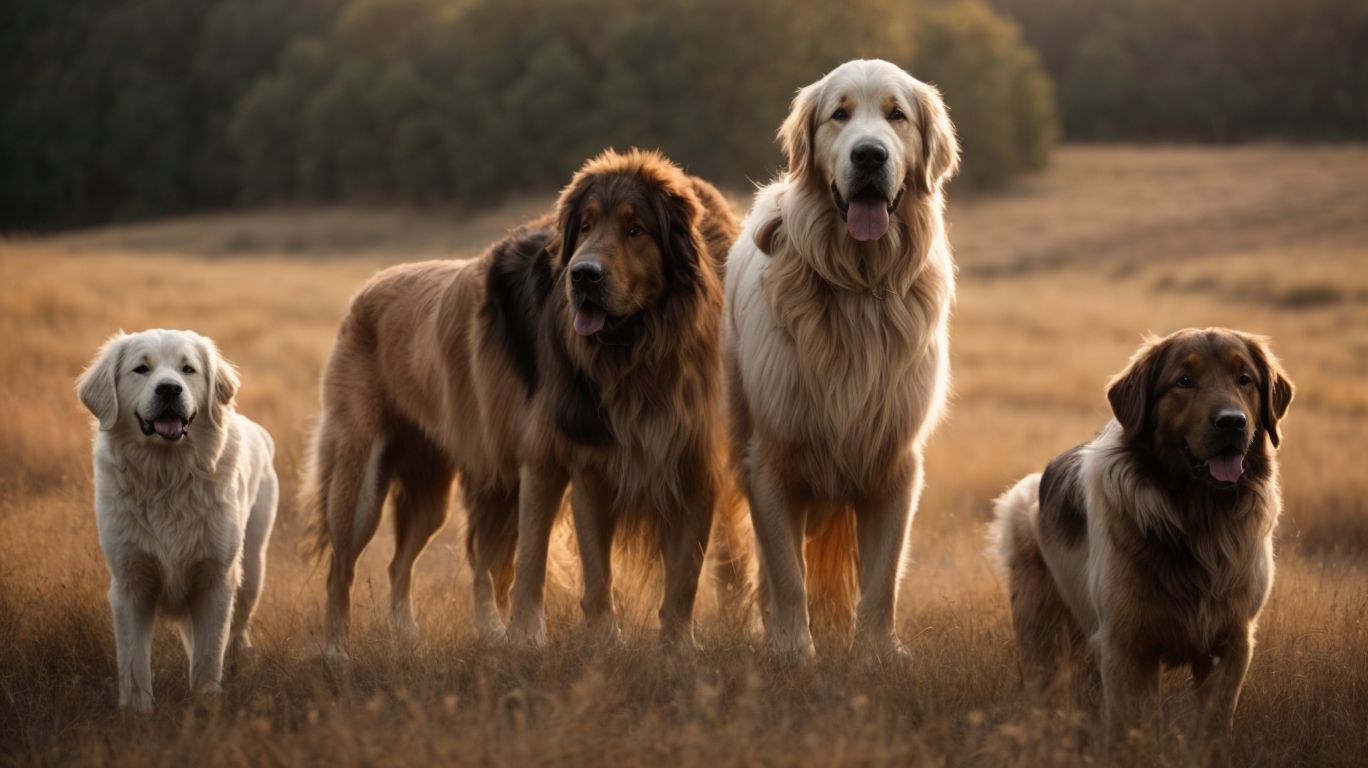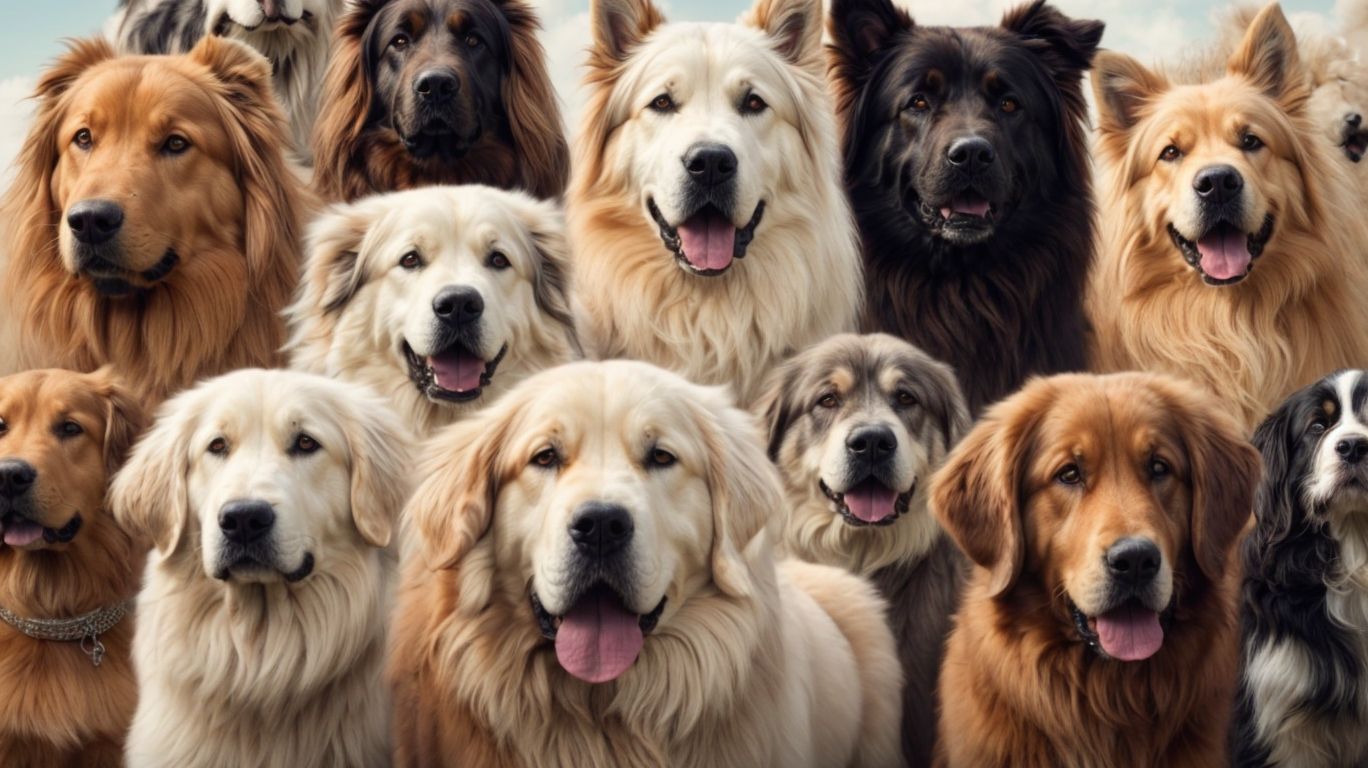
Big Dogs, Bigger Hearts: Choosing the Right Gentle Giant for Your Home
Big dogs, bigger hearts: Choosing the right gentle giant for your home can be an exciting yet daunting decision. From the most popular breeds to their characteristics, grooming needs, and health concerns, there are many factors to consider when adding a big dog to your family.
In this article, we will explore everything you need to know about big dogs, including how to choose the right one for your living arrangements, budget, and activity level. So, grab a cup of coffee and let’s dive into the world of big dogs together!
What Are Big Dogs?
Big Dogs, often referred to as Gentle Giants, encompass a variety of large breeds that are known for their impressive size and affectionate nature.
These lovable giants have a special way of capturing the hearts of their families with their gentle demeanor and unwavering loyalty. Their imposing stature may seem intimidating at first glance, but their kind and caring personalities make them perfect companions for both adults and children. Big Dogs are often characterized by their protective instincts, making them excellent members of the household and reliable guardians of the home. Their affectionate nature shines through in their eagerness to cuddle up with their owners, bringing warmth and joy to any family.
What Are the Most Popular Big Dog Breeds?
When it comes to Big Dog breeds, several stand out as the most popular choices among dog enthusiasts and families for their unique characteristics and companionship.
- One such beloved breed is the gentle giant known as the Labrador Retriever, renowned for its friendly and outgoing nature. Labradors are not only excellent family companions but are also known for their loyalty, making them highly protective of their loved ones.
- Similarly, the Golden Retriever is another favorite amongst families due to its affectionate temperament and love for children. These dog-friendly breeds thrive in a home environment where they receive love and attention, making them ideal companion dogs for those seeking a loyal and devoted furry friend.
What Are the Characteristics of Big Dogs?
The characteristics of Big Dogs encompass a blend of loyalty, playfulness, and protective instincts, making them wonderful companions for those seeking a canine friend with a bigger heart.
In addition to their remarkable loyalty, Big Dogs tend to exhibit high levels of intelligence, which can be seen in their ability to learn and adapt to various situations. Their playful nature often shines through in their interactions with humans and other animals, showcasing their friendly and engaging personalities.
Big Dogs are known for their playful antics and energetic behavior tendencies, which make them great partners for outdoor activities and exercise. Despite their imposing size, these gentle giants often display a sweet and affectionate side, further solidifying their reputation as beloved family pets.
Are Big Dogs Good for Families?
Big Dogs often make excellent family pets due to their affectionate nature, protective instincts, and the joy they bring to households seeking canine companionship.
Their loyalty and devotion to their owners create a strong bond within the family unit. Big Dogs, when properly socialized, can flourish in a family environment, becoming integral members of the household.
Their compatibility with children is often remarkable, as they tend to be gentle and patient, making them ideal playmates for kids. Their high level of intelligence allows them to be easily trained, enhancing their adaptability and making them responsive to commands.
Integrating a Big Dog into your family can add a valuable dimension to your home life, bringing joy, companionship, and a sense of security.
Do Big Dogs Require More Space and Exercise?
Given their size and energy levels, Big Dogs typically require ample space to roam and regular exercise to maintain their health and well-being.
Big Dogs, known for their exuberant spirit and vitality, thrive in environments that allow them to stretch their muscles and expend their boundless energy. It is essential for these breeds to engage in daily activities that challenge both their physical prowess and mental acuity.
Regular exercise not only helps in preventing obesity and related health issues but also promotes a healthy outlet for their energy. Mental stimulation through activities like puzzle games and interactive play is equally crucial to prevent boredom and behavioral problems.
Understanding the exercise and training requirements of Big Dogs is vital for ensuring their overall happiness and well-being.
What Are the Grooming Needs of Big Dogs?
Big Dogs may have varying grooming needs depending on their coat type, shedding patterns, and overall health, necessitating regular grooming sessions to keep them clean and healthy.
Some large breeds like Golden Retrievers and German Shepherds have double coats that require special attention. Brushing with a slicker brush or undercoat rake can help remove loose fur and prevent matting. It’s important to establish a consistent brushing routine to avoid tangles and mats, especially during shedding seasons.
Regular baths using dog-friendly shampoos are essential to keep their skin and coat clean. Proper dog nutrition plays a vital role in maintaining a healthy coat. Monitoring for any signs of skin issues or allergies is crucial for their overall well-being.
How to Choose the Right Big Dog for Your Home?
When selecting a Big Dog to welcome into your home, it’s essential to consider factors such as size, temperament, and compatibility with your living arrangements to ensure a harmonious and fulfilling companionship.
A crucial aspect to evaluate when deciding on the right Big Dog breed is their temperament. Each dog breed has unique characteristics, some more suited for active households, while others thrive in calmer environments. It’s vital to match the temperament of the dog with your lifestyle and energy levels.
Considering dog size is important, especially if you have limited space or specific requirements. Larger breeds may require more room to move around and exercise, so be sure to assess your living situation to find a size that fits comfortably. Training is another critical factor…
What Are Your Living Arrangements?
Assessing your living arrangements is crucial when choosing a Big Dog, as factors like living space, yard size, and proximity to parks or walking trails can impact the comfort and well-being of your new furry companion.
Consider creating a dog-friendly home environment that accommodates the size and needs of your Big Dog. Providing ample indoor space for them to move around comfortably and establish a designated area for rest and play can contribute significantly to their happiness.
Incorporating suitable training areas within your living space can aid in behavioral development and strengthening the bond between your family and the dog. Having access to a secure outdoor area where your Big Dog can exercise, play, and explore is essential for their physical and mental stimulation.
What Is Your Budget?
Setting a realistic budget is essential when considering a Big Dog, as expenses related to food, grooming, veterinary care, and training should be factored into your financial planning to provide the best care for your canine companion.
When it comes to Dog Food, larger breeds often have higher dietary requirements, so investing in quality, nutritionally balanced food is crucial for their health and well-being.
Ensuring regular check-ups and vaccinations with a trusted Dog Veterinary Care provider will contribute to preventing costly health issues down the line.
Grooming needs, such as regular baths, nail trimming, and coat maintenance, should also be considered in your budgeting.
By planning ahead and budgeting wisely, you can ensure that your Big Dog receives the care and attention it deserves without financial strain.
Do You Have Other Pets?
If you have other pets in your household, it’s vital to choose a Big Dog with a temperament conducive to socialization and compatibility with other animals to ensure a peaceful and harmonious coexistence.
Big dogs that are well-socialized and have good adaptability skills are more likely to integrate smoothly into a household with existing pets. This is crucial for preventing dog behavior problems and creating a positive environment for all animals involved.
Dog socialization is key in helping your big dog feel comfortable around other pets, and introducing them gradually can foster a sense of trust and acceptance between all furry companions. Consistent training and reinforcement of good behavior are essential aspects of promoting dog obedience and setting the foundation for successful interactions.
What Is Your Activity Level?
Assessing your own activity level and exercise routine is crucial when choosing a Big Dog, as certain breeds may require more physical activity and mental stimulation to thrive and remain healthy.
Consider the playful nature of dogs and how important it is to meet their exercise needs. Dog playfulness varies greatly among breeds, with some needing frequent outdoor activities and interactive playtime. Dogs with higher intelligence levels often benefit from mental stimulation in the form of puzzle toys, training sessions, and engaging activities.
Incorporating regular exercise not only keeps your furry friend physically fit but also helps in preventing behavioral issues that may arise from boredom or lack of mental challenges. Understanding the specific exercise requirements of different breeds can lead to a fulfilling companionship and a healthier lifestyle for both you and your canine buddy.
What Are the Health Concerns for Big Dogs?
Health concerns for Big Dogs can vary but often include issues related to joint health, heart conditions, and obesity, underscoring the importance of regular veterinary check-ups and preventive care.
Ensuring a balanced diet tailored to the specific nutritional needs of larger breeds is paramount in maintaining their overall well-being. Exercises suitable for their size and breed can help prevent obesity and maintain healthy joints. Regular grooming and attention to skin and coat health can aid in minimizing potential allergies and skin irritations. Proactive healthcare measures, such as parasite prevention and vaccinations, play a crucial role in extending the lifespan of these magnificent animals.
What Are the Most Common Health Issues for Big Dogs?
Common health issues that Big Dogs may face include hip dysplasia, bloat, and skin allergies, highlighting the need for attentive care, regular monitoring, and prompt intervention to address any health concerns.
- Hip dysplasia, a common orthopedic issue in larger dogs, can cause discomfort, limping, and decreased mobility.
- Bloat, also known as gastric dilatation-volvulus, is a severe condition where the stomach fills with gas and twists, leading to life-threatening consequences if not treated promptly.
- Skin allergies can manifest as itching, redness, and hair loss, often triggered by environmental factors or food sensitivities.
Early detection of these health problems is crucial for effective management, promoting a healthy and happy life for your beloved pet.
How to Keep Your Big Dog Healthy?
Maintaining the health of your Big Dog involves a holistic approach that includes a balanced diet, regular exercise, preventive healthcare measures, and attentive grooming to ensure their overall well-being and longevity.
When it comes to Dog Nutrition, it’s essential to provide your Big Dog with high-quality, age-appropriate food that meets their specific needs. Consider consulting with a veterinarian to determine the right diet for your big furry friend.
In terms of exercise, big dogs benefit from regular physical activity to keep them fit and mentally stimulated. Engaging in activities like long walks, running, or interactive play sessions can help maintain their muscle tone and prevent obesity.
Regular grooming, including brushing their coat, trimming nails, and cleaning ears, not only keeps your dog looking great but also contributes to their well-being by preventing skin issues and infections.
Scheduling routine veterinary check-ups is crucial for early detection of Dog Health Issues. These visits allow the vet to monitor your dog’s health, administer necessary vaccinations, and address any concerns that may arise.
By incorporating these tips into your Big Dog’s care routine, you can help them lead a happy and healthy life.
How to Train and Socialize Your Big Dog?
Training and socializing your Big Dog are essential for fostering good behavior, confidence, and positive interactions with other animals and people, setting the foundation for a well-rounded and obedient companion.
Exposure to various environments, situations, and stimuli through socialization helps Big Dogs develop into well-adjusted pets.
Dog Training Tips suggest starting early with basic obedience commands like sit, stay, and come, gradually progressing to more advanced skills.
Consistent positive reinforcement and rewards play a crucial role in reinforcing desired behaviors, while addressing Dog Behavior Problems promptly can prevent them from escalating.
Early intervention in training and socialization not only strengthens the bond between you and your furry friend but also ensures a harmonious existence within your family and community.
What Are the Best Training Methods for Big Dogs?
When training Big Dogs, positive reinforcement, consistency, and patience are key elements in building a strong bond, instilling good habits, and fostering obedience in these intelligent and trainable breeds.
By consistently rewarding desired behaviors with treats, praise, or play, Big Dogs quickly understand what is expected of them and are motivated to repeat these actions. Establishing a structured routine helps in providing clarity and predictability to their learning process.
It’s essential to recognize that each dog has unique learning preferences and adjusting the training approach to suit their individual characteristics is crucial for successful Dog Obedience. Tailoring the training to accommodate the specific intelligence level and temperament of the Big Dog enhances their receptiveness and accelerates progress towards meeting Dog Training Requirements.
How to Socialize Your Big Dog with Other Animals and People?
Socializing your Big Dog from an early age is crucial for promoting positive interactions with other animals and people, helping them develop confidence, adaptability, and appropriate behavior in various social settings.
Gradual exposure techniques play a key role in introducing your Big Dog to new environments and animals in a controlled and positive manner. Start by exposing your dog to calm and friendly dogs in familiar surroundings to build their confidence. Encourage positive interactions through supervised play sessions and gradually increase the complexity of the social situations. By reinforcing good behavior with rewards and praise, you are shaping your dog’s behavior positively. Remember that each dog has its own temperament and level of playfulness, so be patient and adapt your socialization exercises accordingly.




No Comments